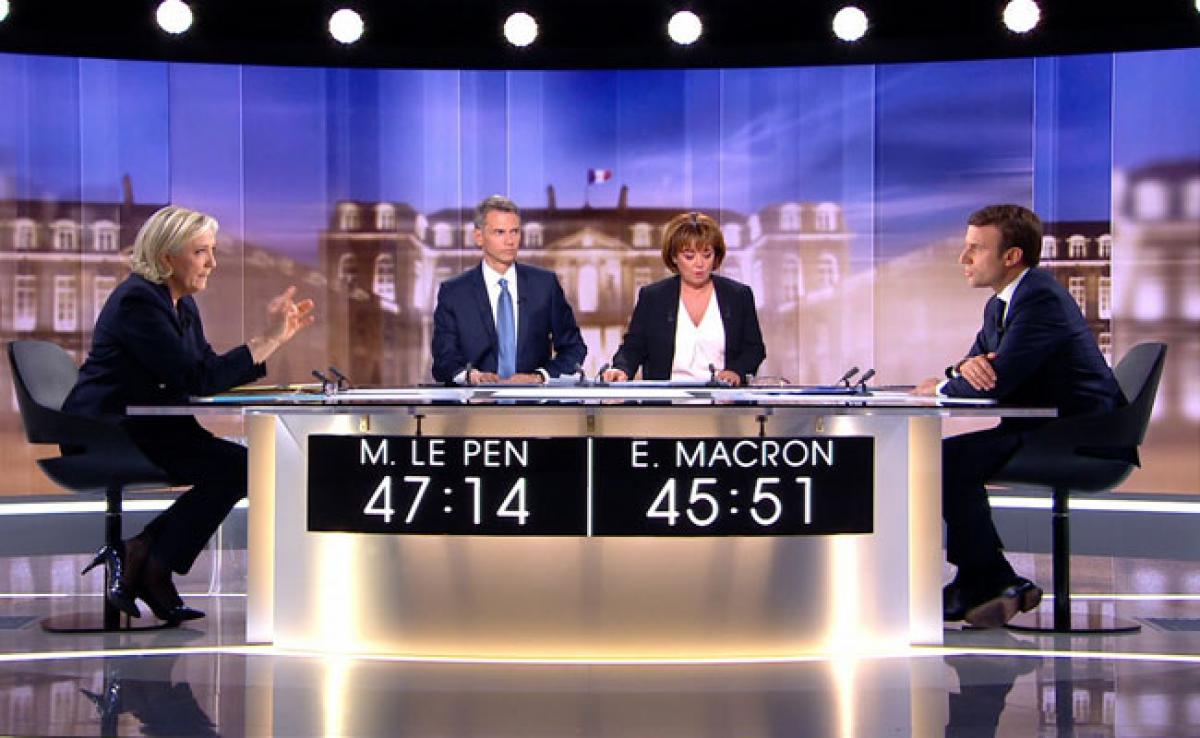Live
- Vivo X200 and X200 Pro Launched in India: Price, Specifications, and Features
- Nitin Gadkari Admits Feeling Embarrassed at Global Summits Over Rising Road Accidents in India
- Opposition Slams ‘One Nation, One Election’ Bill as Anti-Democratic; BJP Allies Support the Move
- Celebrate Karthigai Maha Deepam Virtually with Sri Mandir’s LIVE Darshan Experience
- BJP Extends Support to Samagra Shiksha Abhiyan Employees' Strike, Demands Immediate Regularization and Welfare Benefits
- Dr. M. Priyanka Stresses Quality Education, Nutritious Meals, and Cleanliness in Schools
- Mandal Level CM Cup Sports Concludes in Ija with Promising Talent and Enthusiastic Participation
- Harish Rao Slams Revanth Reddy: "More Talk, Less Action"
- Revolutionising Oil and Gas: Gaurav Kumar Sinha’s AI-Driven Innovations Transforming Efficiency and Profitability
- AiDASH Names Vishal Jain Head of AI to Advance First Integrated Platform for Grid Inspection and Monitoring
Just In

French centrist Emmanuel Macron and his far-right presidential rival Marine Le Pen clashed over terrorism, the economy and Europe Wednesday in a bad-tempered TV debate that laid bare their profoundly different visions for the country.
French centrist Emmanuel Macron and his far-right presidential rival Marine Le Pen clashed over terrorism, the economy and Europe Wednesday in a bad-tempered TV debate that laid bare their profoundly different visions for the country.
The duel ahead of Sunday's election was billed as a confrontation between Macron's call for openness and pro-market reforms and Le Pen's France-first nationalism.
The tone was set in the opening minutes, with Le Pen branding the former economy minister and investment banker "the candidate of the elite" and the "darling of the system".
Macron replied that Le Pen, the 48-year-old scion of the National Front (FN) party, was "the heir of a system which has prospered from the fury of the French people for decades", adding: "You play with fear."
The 39-year-old frequently branded Le Pen a liar and even a "parasite of the system", who he said lived off the frustrations of France's blocked political system.
On Europe, Le Pen accused Macron of being "submissive" towards German Chancellor Angela Merkel, saying: "France will be led by a woman, either me or Mrs Merkel."
She also accused Macron of an "indulgent attitude" towards Islamic fundamentalism and constantly sought to remind viewers of his role as a minister in unpopular President Francois Hollande's Socialist government.
But Macron was in combative form throughout, repeatedly portraying Le Pen's proposals as simplistic, defeatist or dangerous and targeting her proposals to withdraw France from the euro in particular.
The euro policy "was the big nonsense of Marine Le Pen's programme," he said midway through the 140-minute debate.
Le Pen called the euro, shared by 19 countries in the European Union and blamed by some in France for a rise in prices, as "the currency of bankers, it's not the people's currency."
Trailing in the polls, the debate was probably her last chance to change the dynamics of the race ahead of the final weekend of a long and unpredictable campaign.
A poll by the Elabe group for the BFM channel immediately afterwards showed that 63 percent of people interviewed found Macron the most convincing versus 34 percent for Le Pen.
This broadly mirrors forecasts for Sunday's vote.
Macron would win around 59 percent to 41 percent if the vote were held now, surveys suggest, but previous debates during the rollercoaster French campaign have shifted public opinion.
Normalisation of far-right
The duel marked a new step into the mainstream for Le Pen, whose party was once considered by France's political establishment to be an extremist fringe that should be boycotted.
When her father Jean-Marie Le Pen made it into the final round of the presidential election in 2002, his conservative opponent Jacques Chirac refused to debate with him out of fear of "normalising hate and intolerance".
In the first round of the election on April 23, Marine Le Pen finished second scoring 21.3 percent after softening the FN's image over the past six years -- but without fully removing doubt about the party's core beliefs.
She sees her rise as the consequence of growing right-wing nationalism and a backlash against globalisation seen in the election of Donald Trump in the United States and Britain's decision to leave the European Union.
"I am the candidate of the people of France such as we love it, of the nation that protects jobs, security, our borders," she said in her opening comments.
Abstention factor
The debate was unlikely to have swayed any committed supporters of either candidate, but it could influence the roughly 18 percent of undecided voters and others who were planning to abstain.
Like much of the French press, daily Le Monde deplored a "brutal debate" that was "violent from start to finish".
Many supporters of Communist-backed candidate Jean-Luc Melenchon, who came fourth in the first round, have said they will not vote on Sunday, comparing the final round as a choice between "the plague and cholera".
President Hollande and members of the government have led warnings about the risk of a Le Pen presidency.
"We are in a zone of absolute danger," warned Education Minister Najat Vallaud-Belkacem before the debate. "Do not play Russian roulette with our democracy."
Hollande told reporters that "we shouldn't think the result is a foregone conclusion" and urged Macron, his former adviser and economy minister, to make clear his different vision of France in Europe and the world.
Macron quit the government last August to concentrate on his new centrist political movement En Marche, which has drawn 250,000 members in 12 months.
On Thursday, Macron will hold his final campaign meeting in the southwest town of Albi while Le Pen will have hers in Ennemain in the north.

© 2024 Hyderabad Media House Limited/The Hans India. All rights reserved. Powered by hocalwire.com







